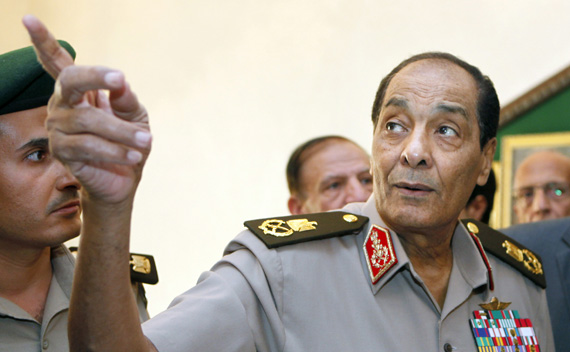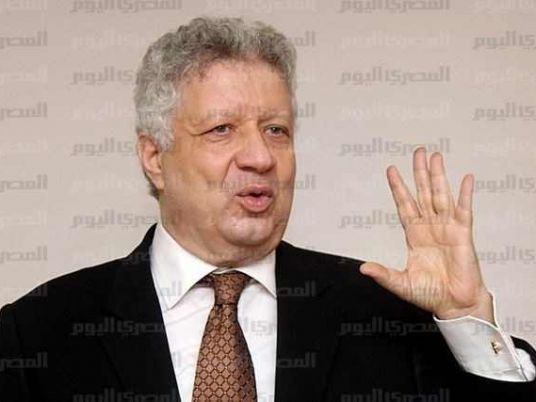News about the ongoing trial of toppled President Hosni Mubarak, his sons, former Interior Minister Habib al-Adly, and six of his aides continues to dominate the front pages of most newspapers, with the top story being Judge Ahmed Refaat’s decision to summon Egypt's current leaders to testify.
The court decided Monday to summon Field Marshal Hussein Tantawi, head of the ruling Supreme Council of the Armed Forces (SCAF), Armed Forces Chief of Staff Samy Anan, former Intelligence Chief Omar Suleiman, Interior Minister Mansour al-Essawy and former Interior Minister Mahmoud Wagdy to testify next week in closed sessions. State-run Al-Akhbar leads with the sensational headline “Field Marshall confronts Mubarak in a secret session on Sunday.”
News about the fifth witness, Central Security Forces Captain Mohamed Abdel Hakeem Mohamed, being charged with perjury after he changed his testimony in favor of Mubarak is also stirring debate. Even though the court acquitted Mohamed before the end of the session, analysts see this as a warning to other witnesses.
In his editorial in private daily Al-Tahrir, Ibrahim Eissa writes about the weak evidence and documents collected against Mubarak, and leads with the headline “Statements that say nothing.” Eissa argues that amid the revolutionary fervor, public pressure on the prosecutor’s office brought Mubarak to court without solid evidence. The process of investigation and evidence collection was chaotic, argues Eissa, citing the refusal of police forces to cooperate with the prosecutor, the destruction of documents on State Security premises, and former Presidential Chief of Staff Zakariya Azmy's alleged destruction of documents at the presidential palace for weeks after Mubarak stepped.
The leftist party paper Al-Wafd runs the headline “The end of the January revolution: Mubarak’s acquittal … Al-Adly rules the Interior Ministry … And preparations for rigging the election” on its front page, citing the increased security around the courtroom outside the Police Academy and the way the defendants are treated.
Al-Tahrir also cites statements by some officers responsible for securing the courtroom praising Mubarak and Adly. Some reportedly told martyrs’ families outside the academy that the defendants would be acquitted for lack of evidence.
In response to the planned Friday protests to get the revolution back on track, the state-run Al-Ahram runs a short piece about the SCAF’s statement on Wednesday warning protesters against damaging public or military property and assigning the protest's organizers the responsibility for securing the demonstration.
Most privately owned newspapers comment on the SCAF’s decision to celebrate Farmers Day on Friday at the Cairo Stadium to coincide with the Tahrir protests. The Ministry of Agriculture is planning to host at least 50,000 farmers from various Egyptian governorates at the stadium, writes privately owned Al-Shorouk.
The general farmers union established after the January protests with about half a million members has, however, refused to take part in the celebrations. Syndicate head Mohamed Abdel Kader announced that farmers would instead march from the Ministry of Agriculture in Dokki to Tahrir Square where they would plant a tree in tribute to the martyrs of the revolution, writes Al-Shorouk.
Al-Shorouk also runs a special report on the conditions of Egyptian peasants and the main expectations farmers have for their new union, which include providing a social security system and health care, reforming the fertilizers market, providing access to local markets without intermediaries, and establishing complementary industries.
Regarding the government's recent interest in celebrating farmers, Wael Kandil writes in his column that the timing is ironic and it is surprising how “love can happen suddenly just like death."
Regarding the punishment of Ahlawy Ultras following unrest at Tuesday's match, Ahmed al-Sawy writes in his Al-Shorouk column that it remains unclear why security forces show such courage and competency in dealing with political protests and violence, yet crime prevails on the street and police officers do not even dare to file a ticket against drivers that double park.
Minister of Interior Mansour al-Essawy, however, speaks of the competency of police forces in an exclusive interview with Al-Wafd. And asked about the preparations for the upcoming parliamentary elections, Essawy describes them as the easiest in Egypt’s history, assuring the public that there will be no problems in the voting process.
As the debate over the supra-constitutional principles continues, the Muslim Brotherhood issued a statement titled "The Critical Stage the Revolution is Going Through" on Wednesday demanding that SCAF to “respect” the results of the March referendum, writes the privately owned Youm7.
Egypt's papers:
Al-Ahram: Daily, state-run, largest distribution in Egypt
Al-Akhbar: Daily, state-run, second to Al-Ahram in institutional size
Al-Gomhurriya: Daily, state-run
Rose al-Youssef: Daily, state-run
Al-Dostour: Daily, privately owned
Al-Shorouk: Daily, privately owned
Al-Wafd: Daily, published by the liberal Wafd Party
Youm7: Daily, privately owned
Al-Tahrir: Daily, privately owned
Sawt al-Umma: Weekly, privately owned
Al-Arabi: Weekly, published by the Arab Nasserist party



